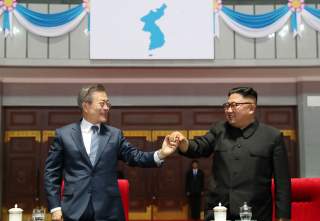The Hanoi Summit – We Asked Timo Kivimaki What Happens Next in U.S.-North Korea Relations
"The failure in Hanoi can seriously undermine the reputation of the United States as a contributor to global stability and peace."
Editor’s Note: Looking for more opinions on where we go after the Hanoi summit? Check out all 80 expert takes on where U.S-North Korea relations go next here.
Donald Trump has often been compared to Richard Nixon; another unpredictable and temperamental leader. While Trump has called North Korea’s leader a “little rocket man,” Nixon has, according to declassified documents, ordered a nuclear strike against North Korea in 1969—an idea his national security adviser, Henry Kissinger, managed to dissuade him from. The fundamental difference between Nixon’s and Trump’s terms is that while the administration and the anti-war public political sentiment managed to tone down Nixon’s aggression, Trump must continuously defend his attempts to “get along” with other countries. Richard Haass, a senior U.S. diplomat, has summarised this position well in his tweet: “The purpose of foreign policy is not ‘to get along’ w other countries. It is to shape the behavior of others in ways that are consistent w your interests and w international order.” Even the Second U.S.-North Korean Summit was obstructed by scheduling the hearings of Michal Cohen, Trump’s former personal attorney, before a House Committee, to take place on the opening day of the summit.
But how would North Korea feel safe enough to give up its nuclear second-strike capability if it was not sure that the United States will not strike first? Clearly the two countries would need to get along well before North Korean decides it no longer needs nuclear deterrence. Consequently, South Korea’s presidential advisers have designed a choreography that demonstrates success already at early stages of negotiation, to make compromises easier. Public photo events have been a highly visible part of this strategy of “frontloading peace dividend.” Yet, the U.S. media and security and foreign policy establishment remain overly sceptical towards the peace process, even though in a very short time many progressive steps have been made.
Under popular pressure, Trump has had to modify his compromise regarding military exercises after consultation with his advisory team and the national security establishment. Soon after that, unsurprisingly, South Korean intelligence sources confirmed that North Korea has started to rebuild some of its nuclear testing facilities.
If the peace process is left just for the two Koreas (and China), the United States’ global position and leadership is threatened not just by Trump’s disrespect of America’s previous commitments or by his science-defying environmental policies. It is also threatened by the war-mongering American mainstream political culture. The failure in Hanoi can seriously undermine the reputation of the United States as a contributor to global stability and peace.
Timo Kivimäki is a professor of international relations at the University of Bath, United Kingdom.
Image: Reuters

